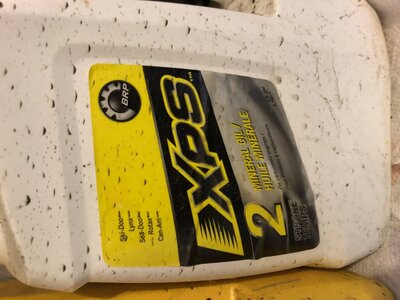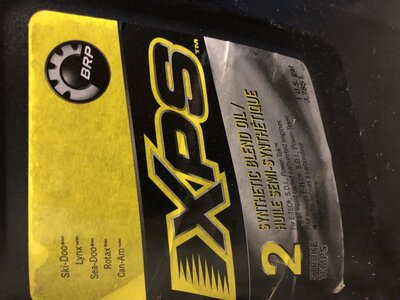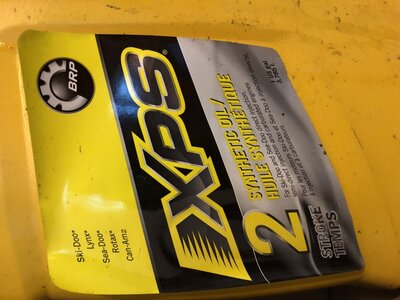I was looking around my garage and I found these 3 bottles of 2 stroke oil. It would be nice to use it on my 2004 superjet but I’m worried if it is not the right oil for it and if it will damage the engine. It does not say tc-w3 on them anywhere. Can I still use this oil?
You are using an out of date browser. It may not display this or other websites correctly.
You should upgrade or use an alternative browser.
You should upgrade or use an alternative browser.
Can I use this oil?
- Thread starter Rider701
- Start date
- Location
- Cumming, Georgia
They should be fine. Sea Doo requires a higher standard oil (API TC) and should withstand more abuse than outboard oil (TCW3). I have run the TC spec oil a good bit in my SJ with no issue.
From Bob is the Oil Guy (a site dedicated to only oil comparisons)
Specifications for 2-stroke oils are developed from the design of the engine and its intended use (no surprise). Since this type engine has a wide variety of applications its no surprise that the specifications for the oils might vary also. For marine and PWC application there are 2 widely accepted standards for certifying 2-stroke engine oils. These are, by no means, not the only standards for 2-stroke engine oils. The European (ISO) and the Japanese (JASCO) standards have been developed, but these standards are not widely accepted in the country (yet). The standards most used in this country are the National Marine Manufacturers Association (NMMATCW3) standard and the American Petroleum Institute (API API-TC) standard. Both of these standards address the oil ability to prevent wear, keep the engine clean and biodegradability. Since these standards were written for different types of 2-stroke engines it stands to reason these standards would be different. Hence, the oils developed from these standards would also be different. The NMMA TCW3 standard was designed by the various manufacturers of outboard motors (Mercury, OMC, Yamaha etc.). These manufacturers so not utilize power valves, limit their max rpms to about 6800 and have excessive cooking capacity. They also must be able to operate at lower rpms for long periods of time without oil fouling the spark plugs. Although it�s true the performance of this type engine has increased in the last several years, the peak engine temperatures are still relatively low. The use of synthetic base oil in TCW# formulations has extended the useful range of these oils; their detergent system (Ashless) is designed for lower operating conditions. This is one of the reasons Bombardier specifically prohibits the use of these oils in their Rotax engines. The API API-TC standard was developed for Air-cooled, high rpm, high output 2-stroke engines operating under severe load conditions. Although this standard is no longer reviewed and updated since 1993 b the API, it still is in effect today. This standard most accurately addresses the condition Rotax and 2-stroke racing motorcycles and snowmobiles operate under. Almost all these oils are formulated with synthetic or synthetic blend base oils and all use a low ash type detergent. If you walk into a store that handles a variety of 2-stroke oils, it is relatively easy to find TCW3 certified oil. The manufacturer proudly displays that certification on each container. API-TC certified oils, on the other hand, are very difficult to find. There are two main reasons for this. First, many small API-TC oil manufacturers can�t or won�t spend the money (about $75,000) for the testing and certification process. Second, most engines requiring API-TC oils are for racing applications (Motocrossers and Crosscountry motorcycles) and don�t offer warranties with their engines anyway. The owner/operators of these machines know what oils work and don�t work. They do not need the API-TC certification on the bottle to help them decide what oil to use. There are many really good API-TC type oils on the market that have never been certified as such. Bombardier/Rotax is the only manufacturer that API-TC certified oils. The TCW3 market is about 10 times the size of the API-TC market. Outboard motor manufacturers require the use of TCW3 certified oils to maintain their warranty. With this great volume in oil sales at stake, it�s easy to see why TCW3 manufacturers can afford to certify their oils.
From Bob is the Oil Guy (a site dedicated to only oil comparisons)
Specifications for 2-stroke oils are developed from the design of the engine and its intended use (no surprise). Since this type engine has a wide variety of applications its no surprise that the specifications for the oils might vary also. For marine and PWC application there are 2 widely accepted standards for certifying 2-stroke engine oils. These are, by no means, not the only standards for 2-stroke engine oils. The European (ISO) and the Japanese (JASCO) standards have been developed, but these standards are not widely accepted in the country (yet). The standards most used in this country are the National Marine Manufacturers Association (NMMATCW3) standard and the American Petroleum Institute (API API-TC) standard. Both of these standards address the oil ability to prevent wear, keep the engine clean and biodegradability. Since these standards were written for different types of 2-stroke engines it stands to reason these standards would be different. Hence, the oils developed from these standards would also be different. The NMMA TCW3 standard was designed by the various manufacturers of outboard motors (Mercury, OMC, Yamaha etc.). These manufacturers so not utilize power valves, limit their max rpms to about 6800 and have excessive cooking capacity. They also must be able to operate at lower rpms for long periods of time without oil fouling the spark plugs. Although it�s true the performance of this type engine has increased in the last several years, the peak engine temperatures are still relatively low. The use of synthetic base oil in TCW# formulations has extended the useful range of these oils; their detergent system (Ashless) is designed for lower operating conditions. This is one of the reasons Bombardier specifically prohibits the use of these oils in their Rotax engines. The API API-TC standard was developed for Air-cooled, high rpm, high output 2-stroke engines operating under severe load conditions. Although this standard is no longer reviewed and updated since 1993 b the API, it still is in effect today. This standard most accurately addresses the condition Rotax and 2-stroke racing motorcycles and snowmobiles operate under. Almost all these oils are formulated with synthetic or synthetic blend base oils and all use a low ash type detergent. If you walk into a store that handles a variety of 2-stroke oils, it is relatively easy to find TCW3 certified oil. The manufacturer proudly displays that certification on each container. API-TC certified oils, on the other hand, are very difficult to find. There are two main reasons for this. First, many small API-TC oil manufacturers can�t or won�t spend the money (about $75,000) for the testing and certification process. Second, most engines requiring API-TC oils are for racing applications (Motocrossers and Crosscountry motorcycles) and don�t offer warranties with their engines anyway. The owner/operators of these machines know what oils work and don�t work. They do not need the API-TC certification on the bottle to help them decide what oil to use. There are many really good API-TC type oils on the market that have never been certified as such. Bombardier/Rotax is the only manufacturer that API-TC certified oils. The TCW3 market is about 10 times the size of the API-TC market. Outboard motor manufacturers require the use of TCW3 certified oils to maintain their warranty. With this great volume in oil sales at stake, it�s easy to see why TCW3 manufacturers can afford to certify their oils.
- Location
- California
It will be great oil. Just drain the tank first because it might have issues mixing well with TCW-3 oils.
I am using the white bottle (Mineral) oil in my new 61X that I just rebuilt for break in oil since all the TCW-3 I have is synthetic.
As said above the seadoo oil is really good stuff and better than TCW-3.
And all three bottles of the seadoo oil are compatible and can be mixed together.
I am using the white bottle (Mineral) oil in my new 61X that I just rebuilt for break in oil since all the TCW-3 I have is synthetic.
As said above the seadoo oil is really good stuff and better than TCW-3.
And all three bottles of the seadoo oil are compatible and can be mixed together.
- Location
- Red Bluff CA
Lol. Listening to 25 yr old oil tech. Cell.phones were as big as dinosaurs back then. Fred flinstone oil isnt the same as today. The oil companies that test my oils, in 2019, say totally different
Pretty much any oil that will mix will be fine in a 2 cycle air pump without powervalves. If your engine specifically calls for a oil. Use it. Otherwise run the cheapest or freest stuff you can get. Most these guys ride peob 5 hours a week. Not 50
Sent from my SM-G930V using Tapatalk
Pretty much any oil that will mix will be fine in a 2 cycle air pump without powervalves. If your engine specifically calls for a oil. Use it. Otherwise run the cheapest or freest stuff you can get. Most these guys ride peob 5 hours a week. Not 50
Sent from my SM-G930V using Tapatalk
SXIPro
JM781 Big Bore
- Location
- Here on the 'X' mostly
Wesson for the win



